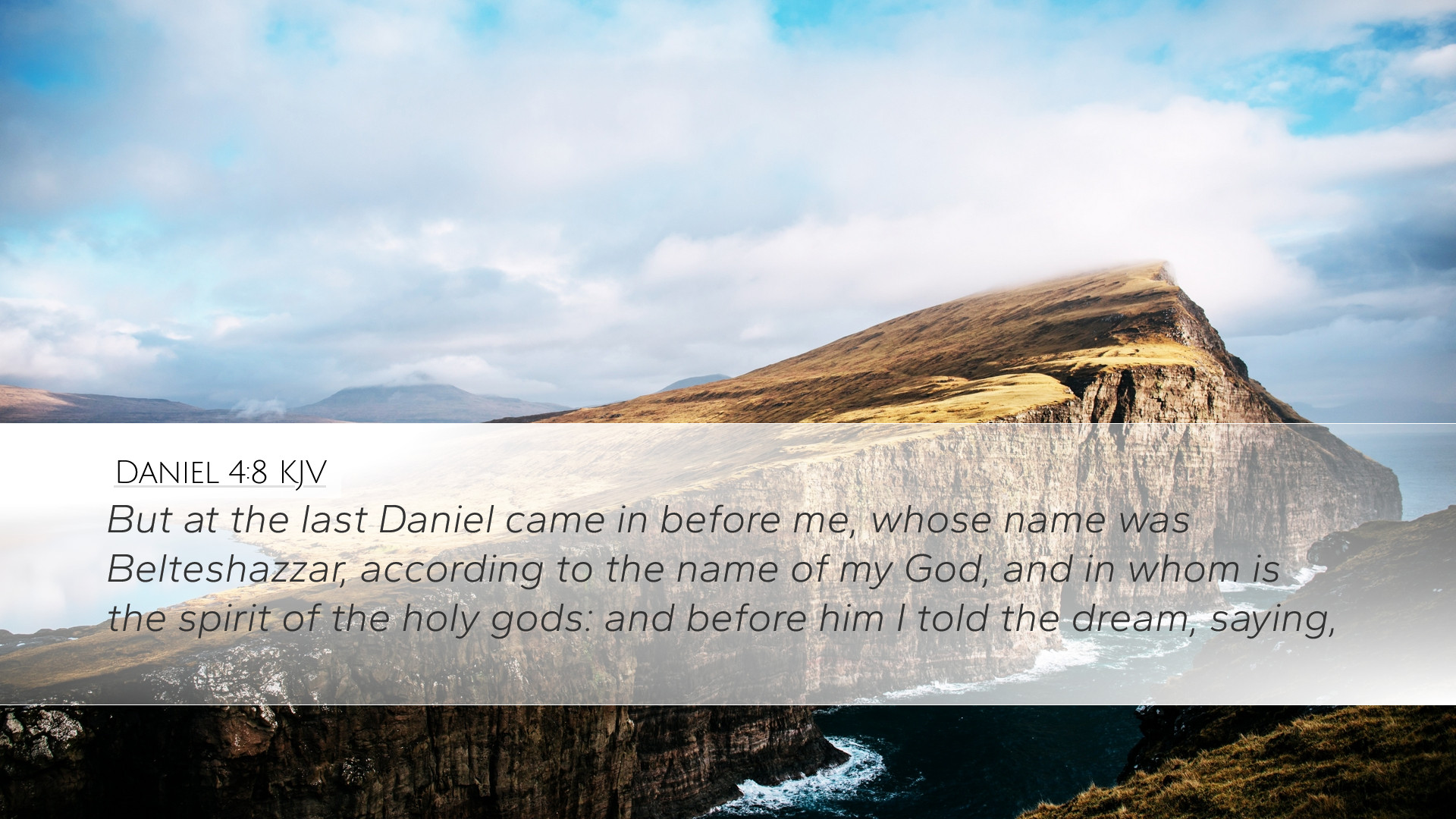Commentary on Daniel 4:8
In Daniel 4:8, we find a significant turning point where the narrative delves into the experiences of King Nebuchadnezzar, specifically his encounters with divine revelation through the prophetic gifts bestowed upon Daniel. This verse underscores the multifaceted relationship between human rulers and divine authority.
Contextual Overview
To fully appreciate the depth of Daniel 4:8, we must consider its broader narrative context. The prior chapters present Nebuchadnezzar as a powerful ruler who exhibits both great wisdom and profound folly. His initial encounters with Daniel demonstrate how the godly wisdom of Daniel stands in stark contrast to the king's reliance on worldly wisdom.
Exegesis of the Text
“But at last Daniel came in before me.” This phrase denotes Nebuchadnezzar’s desperation as he seeks understanding of his troubling dream. The king, after consulting his wise men, finds them utterly incapable of providing an interpretation, further emphasizing his increasing recognition of the limitations of human wisdom.
Significance of Daniel’s Name
The verse refers to Daniel by his Babylonian name, Belteshazzar, which implies a connection to the gods of Babylon. However, it is crucial to note that while the king acknowledges this new name, he ultimately recognizes Daniel’s true calling as a prophet of the Most High God.
The Integrity of Daniel
Despite the name change, the integrity and character of Daniel remain paramount. Daniel consistently demonstrates that his worth and wisdom come from his relationship with God rather than his Babylonian title. Matthews Henry remarks that this illustrates the sovereign hand of God in raising up servants who can speak truth to power.
The Role of Divine Revelation
This encounter underlines the theme of divine revelation throughout Scripture. Albert Barnes emphasizes that God communicates with humanity through dreams and visions, guiding and redirecting the course of history. In this instance, the dream serves as a direct warning to Nebuchadnezzar about pride and impending judgment.
Contrasting Responses
Examining the contrasting responses of Nebuchadnezzar and Daniel reveals a deeper theological principle. Nebuchadnezzar embodies the struggle and chaotic search for meaning through external means, while Daniel exemplifies the calm assurance that comes from divine revelation.
The Humility of Daniel
Daniel's entrance before the king displays not only his role as a vessel of God's message but also his humble demeanor. Adam Clarke speaks of how Daniel approached the throne not with arrogance as a self-proclaimed prophet but with respectful submission to the king, revealing his own understanding of the divine order.
Theological Insights
- Human Limitations: The failures of the king's wise men accentuate human limitations in understanding divine mysteries.
- Divine Sovereignty: God's sovereignty is a major theme in this chapter, demonstrating that even a king of the greatest empire is subject to divine authority.
- Call to Repentance: Nebuchadnezzar's dream reveals not just future events but also a call to repentance, emphasizing God's desire for restoration rather than destruction.
Applications for Today’s Believers
The themes present in Daniel 4:8 resonate profoundly in today's spiritual landscape. Pastors and theologians can draw from this text to illustrate the importance of seeking godly wisdom and the necessity of humility in leadership roles.
1. The Importance of Divine Wisdom
In a world increasingly dominated by human reasoning and pride, believers are reminded of the necessity to seek wisdom that comes from God. This passage encourages individuals to turn to Scripture and the Holy Spirit for guidance.
2. Leadership and Responsibility
For church leaders, Daniel serves as an example of how to navigate authority with grace and truth. His willingness to engage the king with God’s perspective highlights the role of the church in speaking truth to power calmly and respectfully.
3. Responding to God’s Revelation
Every believer is called to a life of discernment, responding actively to God’s revelations in their own lives. The challenge lies in reflecting upon whether we are like Nebuchadnezzar, seeking external wisdom, or like Daniel, grounded in faith and trust in God’s sovereignty.
Conclusion
Daniel 4:8 serves not only as a historical account but as a rich source of theological insight. Through this verse, we are reminded of the supremacy of God’s wisdom, the need for humble leadership, and the power of divine revelation to transform both individuals and nations. As we study this text, may we aspire to embody the spirit of Daniel, who humbly points others to the ultimate source of truth.


